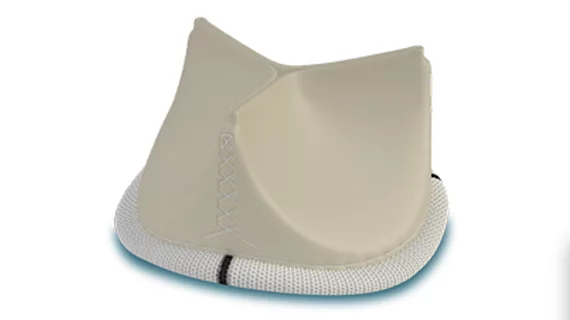Abbott pulls Trifecta heart valves off the market due to early deterioration
The U.S. Food and Drug Administration (FDA) sent notice today about Abbott's decision to stop selling and distributing Trifecta aortic surgical heart valves in the U.S. market. This was an update to the February 2023 letter to healthcare providers about the potential risk of early structural valve deterioration (SVD) with Abbott Trifecta valves.
The vendor said it will no longer sell or distribute the Trifecta Valve and Trifecta Valve with Glide Technology (GT). Abbott said it will collect its unused consigned inventory from hospitals and will assist providers with returning any customer-owned inventory as well.
"Abbott decided to discontinue its Trifecta family of valves to focus on tissue heart valve solutions that maximize possibilities for lifetime management of valvular heart disease. Abbott is initiating inventory-related activities worldwide in accordance with respective regulatory frameworks," Christopher Gallivan, divisional vice president, quality, Abbott Structural Heart, said in the letter to providers today.
The FDA continues to work with the manufacturer to further evaluate the potential risk of early SVD in patients implanted with Trifecta valves and said its recommendations below have not changed. This includes the patient management considerations by Abbott for individuals implanted with Trifecta valves.
Data point to short lifespan for the Trifecta valve
The FDA said in its February letter to providers that information from published literature suggests a higher cumulative incidence of early SVD for Trifecta valves compared to other commercially available surgical bioprosthetic aortic valves. Early deterioration of a heart valve is defined by the FDA as five years or less. In February, the FDA said it was working with the manufacturer to evaluate information from all available sources on this issue. The Trifecta valve features leaflets externally mounted to the valve frame, which are a point of difference and might contribute to the valve issue.
The FDA said it routinely evaluates adverse event reports and published literature to monitor the safety and effectiveness of medical devices. The published literature includes a comparison of durability for Trifecta valves to other commercially available bovine pericardial valves across different timepoints post-implant. Outcomes from these studies suggest a higher cumulative incidence of early SVD and lower freedom from reintervention due to SVD associated with Trifecta valves. The published literature includes results combined for the Trifecta and Trifecta GT valves, and the patient management considerations provided by Abbott apply to both Trifecta valve models, the FDA said.
The FDA said it also received medical device reports (MDRs) that describe early SVD with Trifecta valves. These reports showed a peak time to SVD of three to four years post-implant. Reported outcomes include surgical valve explant/replacement, transcatheter valve-in-valve intervention, and in some cases death, the FDA said.
The first-generation Trifecta valve was first approved in 2011 and was superseded by the newer generation Trifecta GT valve approved by the FDA in 2016.
FDA recommendations or healthcare providers on the Trifecta valve
- Be aware of the potential risk of early SVD with Trifecta valves, and current patient management considerations, as communicated by Abbott.
- Discuss the risks and benefits of all available aortic valve treatment options with your patients and their caregivers as part of shared clinical decision-making prior to surgery.
- Read and carefully follow the instructions for use when implanting a Trifecta GT valve.
- Monitor patients who have undergone implantation with Trifecta valves for signs and symptoms of potential SVD.
- Instruct patients to seek medical attention with new onset of symptoms such as shortness of breath or fatigue.
- Ensure lifelong follow-up visits, conducted at least yearly, including transthoracic echocardiogram assessment of the valve beginning one-year post-implant.
- Report any adverse events with Trifecta valves to the FDA.

